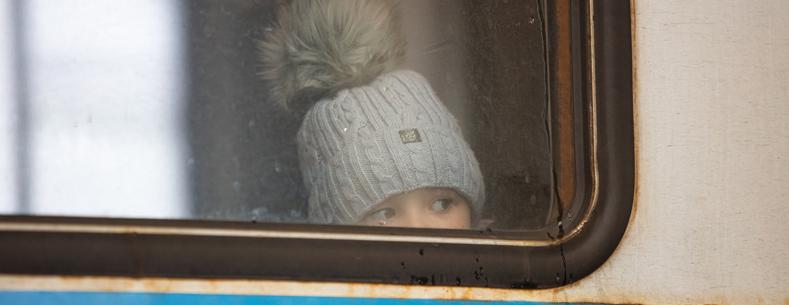I have worked in refugee emergencies for almost 40 years, and rarely have I seen an exodus as rapid as this one.
The UN High Commissioner for Refugees Filippo Grandi speaking on 3 March 2022.
On 24 February Russian forces invaded Ukraine. On 9 March, UN monitoring agencies reported that over 2 million refugees had fled due to the ongoing fighting. It’s likely that the number of refugees will continue to rise in the coming weeks and months. The UN High Commissioner for Refugees estimates that over 4 million people could flee Ukraine in search of protection and support elsewhere.
As numbers continue to grow, countries across the world have been responding to the humanitarian crisis by supplying food, clothing, and medical supplies. Many countries, particularly those bordering Ukraine, have also offered sanctuary to those fleeing the conflict.
This article summarises the response to the rapidly developing humanitarian crisis and details the Welsh Government’s plans to help welcome refugees to Wales. It builds on our previous article, which described the initial response of the Welsh Government and the actions of Senedd Members in solidarity with Ukraine. .
The regional response
More than half of those displaced by the conflict have fled to Poland, with others travelling to bordering countries including Hungary, Moldova, Romania and Slovakia. A data portal established by the UN provides up to date details of the refugee situation. Men aged between 18-60 are prohibited from leaving Ukraine, so refugees are women and children.
The inter-agency Regional Refugee Response Plan (RRP) outlines the response and activities to support those countries’ efforts to help people fleeing Ukraine.
EU and UK support for refugees
While refugees may remain in neighbouring countries for some time hoping to return home, it is possible that many will choose to leave and travel elsewhere. Many will have links and family members living in the EU and the UK. The European Commission activated the Temporary Protection Directive, which means those fleeing the war will be granted temporary protection in the EU, given a residence permit and access to education and to the labour market.
The UK Government has faced criticism over its response, with many calling for a relaxation of the visa requirements to allow more Ukrainians to come to the UK.
On 28 February the Home Secretary highlighted efforts to support British nationals and their families to leave Ukraine. A new route was set-up to allow dependents of British nationals resident in Ukraine who need a visa to apply through the temporary location in Lviv or application centres in neighbouring countries. As part of the points-based immigration route, language requirements and salary thresholds were lowered to ensure more people can be supported.
Further, the Home Secretary explained that:
We are giving British nationals and any person settled in the UK the ability to bring over their immediate Ukrainian family members. Through this extension alone, I can confirm that an additional 100,000 Ukrainians will be able to seek sanctuary in the UK with access to work and public services.
Defending the UK Government’s decision not to introduce full visa waivers for all Ukrainians she said that it “is vital to keep British citizens safe” given “Russian troops are now infiltrating Ukraine and merging into Ukrainian forces”.
On 1 March, the Home Secretary provided an update to Parliament. Responding to continued concerns that requiring biometric checks would cause unnecessary delays, she stated that the capacity at visa application centres has been expanded to meet the increased demand.
Humanitarian support package
The Home Secretary set out a bespoke humanitarian support package, which includes a free Ukrainian family scheme, so:
- British nationals and people settled in the UK can bring a wider group of family members to the UK;
- Parents, grandparents, adult offspring, siblings, and their immediate family members can join family members in the UK; and
- Those joining family members will be granted leave for an initial 12 months and will be able to work and access public funds.
And a humanitarian sponsorship pathway, which:
[…] will open up a route to the UK for Ukrainians who may not have family ties with the UK, but who are able to match with individuals, charities, businesses and community groups. Those who come under this scheme will also be granted leave for an initial period of 12 months, and will be able to work and have access to public services.
Welsh Government response
As set out in our previous article on the conflict, while immigration policy is not devolved to Wales, the Welsh Government has developed a strong stance on supporting asylum seekers and refugees.
In 2019, the Welsh Government declared that Wales would become the world’s first ‘Nation of Sanctuary’, a plan endorsed by the United Nations.
Welsh local authorities, public bodies and the third sector have played a key role in supporting asylum seekers and refugees since the introduction of the Immigration and Asylum Act 1999. All 22 local authorities have provided support to asylum seekers and refugees through UK Government resettlement schemes, including those fleeing Afghanistan and those arriving via the Hong Kong BN(O) Visa Scheme.
The Welsh Government and Members of the Senedd across political parties have expressed strong support to provide sanctuary in Wales for those fleeing Ukraine.
On the 1 March the First Minister said “as a nation of sanctuary, we will do everything we can to support the Ukrainian people. Wales is open to provide a welcome and safety to those fleeing war and persecution”.
The First Minister also wrote to the Prime Minister setting out steps the UK Government should take to provide assistance, including: lifting the requirements for Ukrainians to provide biometric evidence before leaving Ukraine, and extending EU Settlement Scheme family permits beyond the 29 March to allow more to apply. On 3 March Welsh Ministers met with local government and third sector representatives to discuss preparedness for supporting those fleeing the war. The Minister for Social Justice confirmed that “there was a unanimous determination to offer all support possible” and that further updates will be provided in due course.
On 3 March the Senedd’s Equality and Social Justice Committee and Culture, Communications, Welsh Language, Sport, and International Relations Committee sent a letter to the Prime Minister which urged the UK Government to provide humanitarian support for Ukrainians, “beyond what’s already provided”.
While expressions of support have been forthcoming, ensuring refugees have the support they need to resettle can be challenging, particularly at a time when local authorities are continuing to support asylum seekers and refugees who are arriving in Wales via other schemes.
MS Mark Isherwood called on the First Minister to ensure the Welsh Government provides local authorities with support “to enable and encourage them to come forward with a quicker ability to provide support to refugees than occurred with the Syrian programme”.
A Senedd debate on the invasion is happening today (Wednesday 9 March). You can watch it here.
Article by Claire Thomas, Senedd Research, Welsh Parliament






